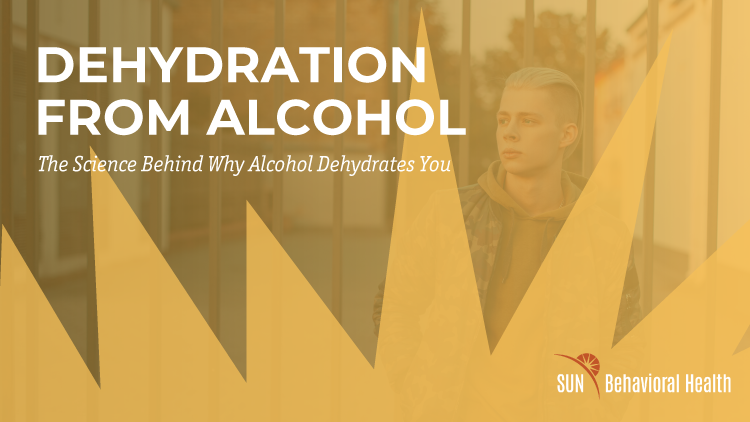Services

Things got a little crazy last night. Your memories are spotty, and you’re not even sure how much you drank, but based on how you feel now, it was probably too much. You feel sick to your stomach, extra groggy, and the sunlight filtering through your window makes your head pound.
Even if you haven’t experienced the feeling personally, you probably knew the above situation was a hangover just by reading about it. If you’re no stranger to hangovers yourself, you’re not alone. 14% of Delawarians self-reported binge drinking in 2021. Drinking, and subsequently hangovers, are practically a staple of American life, with any partygoer preparing for the night’s negative effects the following morning. For some people, that preparation just includes an acceptance of a hangover in exchange for a wild night out. For others, that includes actual preparation, like drinking extra water or making sure not to drink on an empty stomach.
What some might not know is that hangovers are caused by dehydration from alcohol. If that’s the case, how does anyone intending to drink avoid getting dehydrated? Why does alcohol cause dehydration, and what happens if you do get dehydrated from alcohol? Continue reading for all of that and more.
When you drink alcohol, your stomach and digestive system absorb it, filtering it into your bloodstream. There, the alcohol travels throughout the rest of your body. It flows to your brain, which makes you feel drunk, and your lungs, which would impact the result of a breathalyzer test. Your body slowly converts the alcohol into energy and nutrients at the rate of about one drink per hour. Your liver does the heavy lifting here. It breaks alcohol down so your body can process it and detox it better.
You may have heard that alcohol is a diuretic, and that’s true. Diuretics increase urination, meaning you’ll lose a lot of fluids. In addition to being a diuretic, it also limits the production of the hormone vasopressin. Vasopressin keeps diuretics from having too much of an impact, and holds onto water to keep you hydrated. This combination of factors makes alcohol a substance that can dehydrate you quickly.

Dehydration from alcohol is no different than any other kind of dehydration. Alcohol comes with added risk though, because it also makes it more difficult for your body to absorb certain vitamins and minerals.
Dehydration impacts every area of your body. Getting a hangover one day won’t have a long-term impact on your health, but being dehydrated for a long period of time can cause serious damage to your body, including organ damage and death in its most severe cases. Otherwise, frequent dehydration can dry out your skin and give you more wrinkles, damage muscles, and increase your risk of kidney stones.
You’ll know you’re dehydrated from alcohol if you end up with a hangover, but there are some other symptoms of dehydration to keep in mind, whether it’s from alcohol or anything else. You may be dehydrated if you experience any of the following:
Of course, these symptoms can be from a lot of other things, too, but it never hurts to drink more fluids if you experience them.
Your most effective and important weapon against dehydration is drinking fluids. There’s no substitute for that. Water or drinks with electrolytes are ideal.
Eating will also help. Aim for food with lots of protein and rich in vitamins, but replenishing carbohydrates with something like toast also helps, especially if you feel sick to your stomach.
Taking NSAIDs, such as ibuprofen, will help with any hangover headaches. Don’t take Tylenol or other types of acetaminophen if alcohol is in your system, though. Acetaminophen is toxic to the liver in large doses, and your liver will already be “weaker” due to the alcohol, exacerbating acetaminophen’s negative effects.
If you feel sick in any way, exercise is probably one of the last things you want to do, but going for a walk or doing some other light exercise will help your hangover.
Rest up as much as you can, too. Sleep is always healing.
Additionally, don’t drink more alcohol. There’s a common myth that drinking more alcohol will help with withdrawals, but there’s no scientific proof it helps with hangovers. It may actually make them worse.
Obviously, the best way to prevent a hangover is not drinking to begin with, but there are ways to lower the likelihood of dehydration if you will be drinking, too.

For some people, all of these tips are a lot easier said than done. You may be well-acquainted with hangovers now, with the story at the beginning of this article sounding like the story of your life. It might not be about social drinking; maybe instead, you drink at home by yourself, creating a vicious cycle of drinking and dehydration.
If that’s the case, you may have an alcohol use disorder. You may want to quit drinking, but experience devastating withdrawals every time you do. If you’ve experienced that, it may be time to try a treatment for alcoholism program and take the first step on your journey to recovery. Detoxing in a safe, monitored environment will help you healthily cope with your withdrawals so you can stay substance-free.
At SUN Behavioral Delaware, we help people in need of mental healthcare, including individuals living with alcohol use disorders. We have alcohol detox programs and more, including intensive outpatient programs at night for those in need of care that suits their busy schedules. Safety, teamwork, integrity, and compassion are at the heart of everything we do, and we’re here to help you 24/7. Just give us a call at 302-604-5600.
Alcohol dehydrates you, so drinking alcohol will only further your dehydration, leading to headaches and dizziness, among other mild symptoms. The longer you drink while dehydrated, the worse the symptoms will get, and the more dangerous the dehydration becomes.
Darker-colored alcohol, such as wine, brandy, and whiskey, dehydrates you faster due to chemicals in it that make alcohol stay in your body longer.
It depends on each individual and their situation, but even one drink can dehydrate you if you haven’t drunk sufficient fluids beforehand. It takes longer to get dehydrated on beer due to its high water content, but even beer will dehydrate you eventually after a few drinks.
The dehydrated body takes approximately 45 minutes to start absorbing water and combating dehydration. Some studies have shown the body can rehydrate in 45 minutes after 20 ounces of water, and others say about two hours of regular water consumption will get you back to baseline. It still depends on each individual and their body, but no matter what, the answer is ultimately to drink more water.